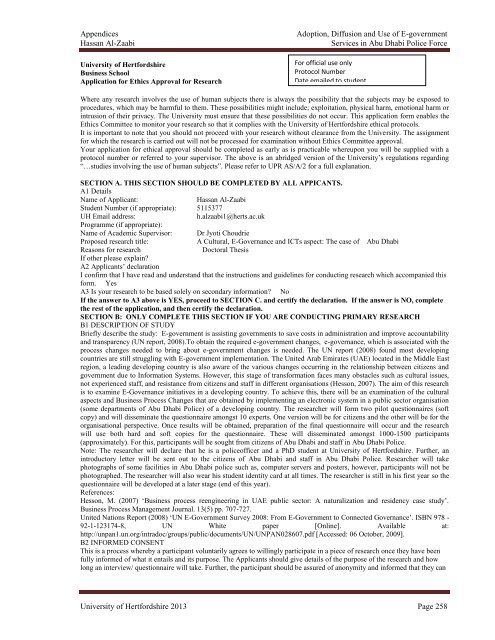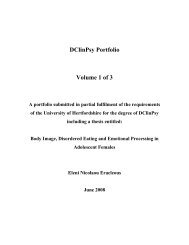Download - University of Hertfordshire Research Archive
Download - University of Hertfordshire Research Archive
Download - University of Hertfordshire Research Archive
You also want an ePaper? Increase the reach of your titles
YUMPU automatically turns print PDFs into web optimized ePapers that Google loves.
Appendices Adoption, Diffusion and Use <strong>of</strong> E-government<br />
Hassan Al-Zaabi Services in Abu Dhabi Police Force<br />
<strong>University</strong> <strong>of</strong> <strong>Hertfordshire</strong><br />
Business School<br />
Application for Ethics Approval for <strong>Research</strong><br />
For <strong>of</strong>ficial use only<br />
Protocol Number<br />
Date emailed to student<br />
Where any research involves the use <strong>of</strong> human subjects there is always the possibility that the subjects may be exposed to<br />
procedures, which may be harmful to them. These possibilities might include; exploitation, physical harm, emotional harm or<br />
intrusion <strong>of</strong> their privacy. The <strong>University</strong> must ensure that these possibilities do not occur. This application form enables the<br />
Ethics Committee to monitor your research so that it complies with the <strong>University</strong> <strong>of</strong> <strong>Hertfordshire</strong> ethical protocols.<br />
It is important to note that you should not proceed with your research without clearance from the <strong>University</strong>. The assignment<br />
for which the research is carried out will not be processed for examination without Ethics Committee approval.<br />
Your application for ethical approval should be completed as early as is practicable whereupon you will be supplied with a<br />
protocol number or referred to your supervisor. The above is an abridged version <strong>of</strong> the <strong>University</strong>‟s regulations regarding<br />
“…studies involving the use <strong>of</strong> human subjects”. Please refer to UPR AS/A/2 for a full explanation.<br />
SECTION A. THIS SECTION SHOULD BE COMPLETED BY ALL APPICANTS.<br />
A1 Details<br />
Name <strong>of</strong> Applicant: Hassan Al-Zaabi<br />
Student Number (if appropriate): 5115377<br />
UH Email address: h.alzaabi1@herts.ac.uk<br />
Programme (if appropriate):<br />
Name <strong>of</strong> Academic Supervisor: Dr Jyoti Choudrie<br />
Proposed research title: A Cultural, E-Governance and ICTs aspect: The case <strong>of</strong> Abu Dhabi<br />
Reasons for research Doctoral Thesis<br />
If other please explain?<br />
A2 Applicants‟ declaration<br />
I confirm that I have read and understand that the instructions and guidelines for conducting research which accompanied this<br />
form. Yes<br />
A3 Is your research to be based solely on secondary information? No<br />
If the answer to A3 above is YES, proceed to SECTION C. and certify the declaration. If the answer is NO, complete<br />
the rest <strong>of</strong> the application, and then certify the declaration.<br />
SECTION B: ONLY COMPLETE THIS SECTION IF YOU ARE CONDUCTING PRIMARY RESEARCH<br />
B1 DESCRIPTION OF STUDY<br />
Briefly describe the study: E-government is assisting governments to save costs in administration and improve accountability<br />
and transparency (UN report, 2008).To obtain the required e-government changes, e-governance, which is associated with the<br />
process changes needed to bring about e-government changes is needed. The UN report (2008) found most developing<br />
countries are still struggling with E-government implementation. The United Arab Emirates (UAE) located in the Middle East<br />
region, a leading developing country is also aware <strong>of</strong> the various changes occurring in the relationship between citizens and<br />
government due to Information Systems. However, this stage <strong>of</strong> transformation faces many obstacles such as cultural issues,<br />
not experienced staff, and resistance from citizens and staff in different organisations (Hesson, 2007). The aim <strong>of</strong> this research<br />
is to examine E-Governance initiatives in a developing country. To achieve this, there will be an examination <strong>of</strong> the cultural<br />
aspects and Business Process Changes that are obtained by implementing an electronic system in a public sector organisation<br />
(some departments <strong>of</strong> Abu Dhabi Police) <strong>of</strong> a developing country. The researcher will form two pilot questionnaires (s<strong>of</strong>t<br />
copy) and will disseminate the questionnaire amongst 10 experts. One version will be for citizens and the other will be for the<br />
organisational perspective. Once results will be obtained, preparation <strong>of</strong> the final questionnaire will occur and the research<br />
will use both hard and s<strong>of</strong>t copies for the questionnaire. These will disseminated amongst 1000-1500 participants<br />
(approximately). For this, participants will be sought from citizens <strong>of</strong> Abu Dhabi and staff in Abu Dhabi Police.<br />
Note: The researcher will declare that he is a police<strong>of</strong>ficer and a PhD student at <strong>University</strong> <strong>of</strong> <strong>Hertfordshire</strong>. Further, an<br />
introductory letter will be sent out to the citizens <strong>of</strong> Abu Dhabi and staff in Abu Dhabi Police. <strong>Research</strong>er will take<br />
photographs <strong>of</strong> some facilities in Abu Dhabi police such as, computer servers and posters, however, participants will not be<br />
photographed. The researcher will also wear his student identity card at all times. The researcher is still in his first year so the<br />
questionnaire will be developed at a later stage (end <strong>of</strong> this year).<br />
References:<br />
Hesson, M. (2007) „Business process reengineering in UAE public sector: A naturalization and residency case study‟.<br />
Business Process Management Journal. 13(5) pp. 707-727.<br />
United Nations Report (2008) „UN E-Government Survey 2008: From E-Government to Connected Governance‟. ISBN 978 -<br />
92-1-123174-8, UN White paper [Online]. Available at:<br />
http://unpan1.un.org/intradoc/groups/public/documents/UN/UNPAN028607.pdf [Accessed: 06 October, 2009].<br />
B2 INFORMED CONSENT<br />
This is a process whereby a participant voluntarily agrees to willingly participate in a piece <strong>of</strong> research once they have been<br />
fully informed <strong>of</strong> what it entails and its purpose. The Applicants should give details <strong>of</strong> the purpose <strong>of</strong> the research and how<br />
long an interview/ questionnaire will take. Further, the participant should be assured <strong>of</strong> anonymity and informed that they can<br />
<strong>University</strong> <strong>of</strong> <strong>Hertfordshire</strong> 2013 Page 258
















